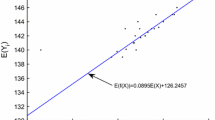Abstract
Almost Random Projection Machine (aRPM) is based on generation and filtering of useful features by linear projections in the original feature space and in various kernel spaces. Projections may be either random or guided by some heuristics, in both cases followed by estimation of relevance of each generated feature. Final results are in the simplest case obtained using simple voting, but linear discrimination or any other machine approach may be used in the extended space of new features. New feature is added as a hidden node in a constructive network only if it increases the margin of classification, measured by the increase of the aggregated activity of nodes that agree with the final decision. Calculating margin more weight is put on vectors that are close to the decision threshold than on those classified with high confidence. Training is replaced by network construction, kernels that provide different resolution may be used at the same time, and difficult problems that require highly complex decision borders may be solved in a simple way. Relation of this approach to Support Vector Machines and Liquid State Machines is discussed.
Access this chapter
Tax calculation will be finalised at checkout
Purchases are for personal use only
Preview
Unable to display preview. Download preview PDF.
Similar content being viewed by others
References
Rumelhart, D.E., Hinton, G.E., Williams, R.J.: Learning internal representations by error propagation. In: Rumelhart, D.E., McCleland, J.L. (eds.) Parallel Distributed Processing: Explorations in Microstructure of Congnition. Foundations, vol. 1, pp. 318–362. MIT Press, Cambridge (1986)
O’Reilly, R., Munakata, Y.: Computational Explorations in Cognitive Neuroscience. MIT-Press, Cambridge (2000)
Buonomano, D., Maass, W.: State-dependent computations: Spatiotemporal processing in cortical networks. Nature Reviews in Neuroscience 10(2), 113–125 (2009)
Maass, W., Natschläger, T., Markram, H.: Real-time computing without stable states: A new framework for neural computation based on perturbations. Neural Computation 14, 2531–2560 (2002)
Jaeger, H., Haas, H.: Harnessing nonlinearity: Predicting chaotic systems and saving energy in wireless communication. Science 304, 78–80 (2004)
Jaeger, H., Maass, W., Principe, J.: Introduction to the special issue on echo state networks and liquid state machines. Neural Networks 20(3), 287–289 (2007)
Cover, T.M.: Geometrical and statistical properties of systems of linear inequalities with applications in pattern recognition. IEEE Transactions on Electronic Computers 14, 326–334 (1965)
Schölkopf, B., Smola, A.: Learning with Kernels. In: Support Vector Machines, Regularization, Optimization, and Beyond. MIT Press, Cambridge (2001)
Schapire, R., Singer, Y.: Improved boosting algorithms using confidence-rated predictions. Machine Learning 37, 297–336 (1999)
Duch, W., Maszczyk, T.: Almost random projection machine. In: Alippi, C., Polycarpou, M., Panayiotou, C., Ellinas, G. (eds.) ICANN 2009. LNCS, vol. 5768, pp. 789–798. Springer, Heidelberg (2009)
Duch, W.: k-separability. In: Kollias, S.D., Stafylopatis, A., Duch, W., Oja, E. (eds.) ICANN 2006. LNCS, vol. 4131, pp. 188–197. Springer, Heidelberg (2006)
Grochowski, M., Duch, W.: Projection Pursuit Constructive Neural Networks Based on Quality of Projected Clusters. In: Kůrková, V., Neruda, R., Koutník, J. (eds.) ICANN 2008, Part II. LNCS, vol. 5164, pp. 754–762. Springer, Heidelberg (2008)
Buesing, L., Maass, W.: A spiking neuron as information bottleneck. Neural Computation 22, 1–32 (2010)
Brown, D.: N-bit parity networks. Neural Networks 6, 607–608 (1993)
Grochowski, M., Duch, W.: Learning highly non-separable Boolean functions using Constructive Feedforward Neural Network. In: de Sá, J.M., Alexandre, L.A., Duch, W., Mandic, D.P. (eds.) ICANN 2007. LNCS, vol. 4668, pp. 180–189. Springer, Heidelberg (2007)
Duch, W., Maszczyk, T.: Universal learning machines. In: Chan, J.H. (ed.) ICONIP 2009, Part II. LNCS, vol. 5864, pp. 206–215. Springer, Heidelberg (2009)
Grąbczewski, K., Duch, W.: The separability of split value criterion. In: Proceedings of the 5th Conf. on Neural Networks and Soft Computing, Zakopane, Poland, pp. 201–208. Polish Neural Network Society (2000)
Asuncion, A., Newman, D.: UCI machine learning repository (2009), http://www.ics.uci.edu/~mlearn/MLRepository.html
Jäkel, F., Schölkopf, B., Wichmann, F.A.: Does cognitive science need kernels? Trends in Cognitive Sciences 13(9), 381–388 (2009)
Guyon, I., Gunn, S., Nikravesh, M., Zadeh, L.: Feature extraction, foundations and applications. Physica Verlag, Heidelberg (2006)
Author information
Authors and Affiliations
Editor information
Editors and Affiliations
Rights and permissions
Copyright information
© 2010 Springer-Verlag Berlin Heidelberg
About this paper
Cite this paper
Maszczyk, T., Duch, W. (2010). Almost Random Projection Machine with Margin Maximization and Kernel Features. In: Diamantaras, K., Duch, W., Iliadis, L.S. (eds) Artificial Neural Networks – ICANN 2010. ICANN 2010. Lecture Notes in Computer Science, vol 6353. Springer, Berlin, Heidelberg. https://doi.org/10.1007/978-3-642-15822-3_5
Download citation
DOI: https://doi.org/10.1007/978-3-642-15822-3_5
Publisher Name: Springer, Berlin, Heidelberg
Print ISBN: 978-3-642-15821-6
Online ISBN: 978-3-642-15822-3
eBook Packages: Computer ScienceComputer Science (R0)




